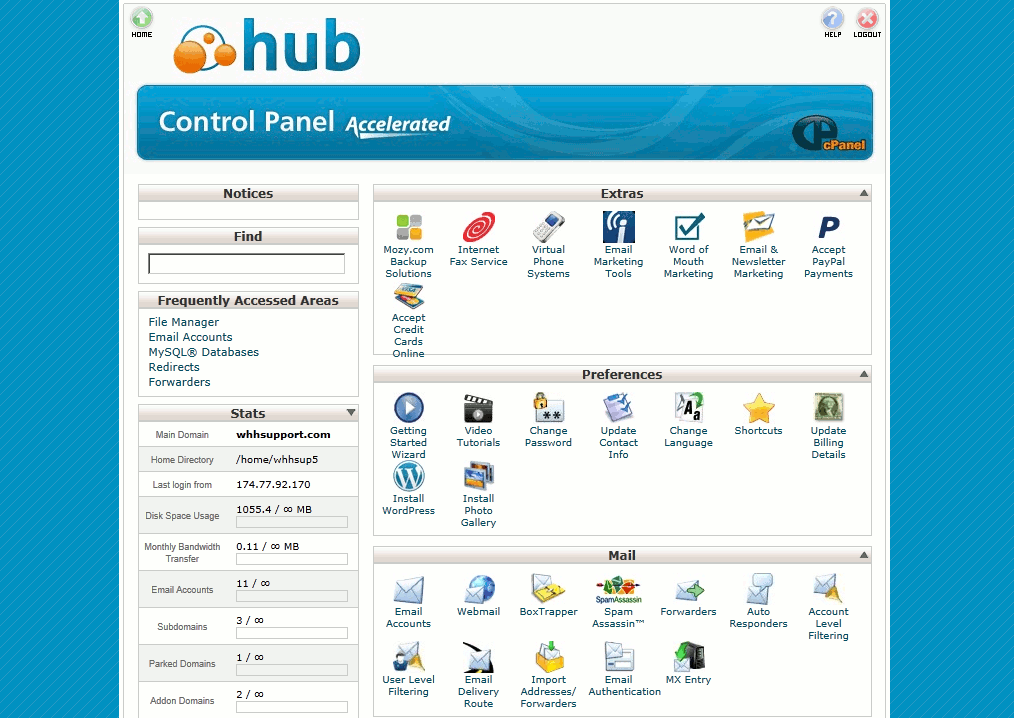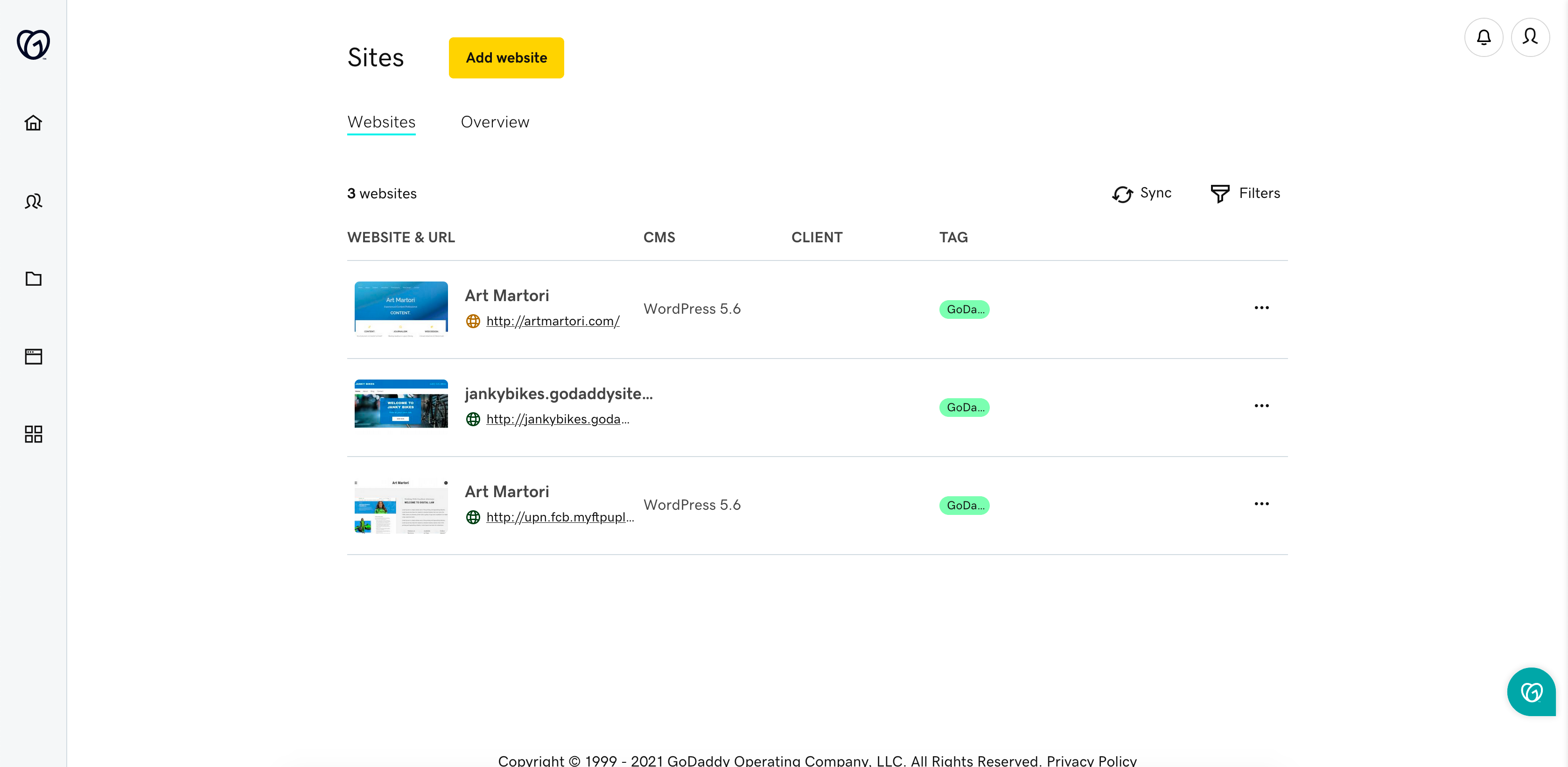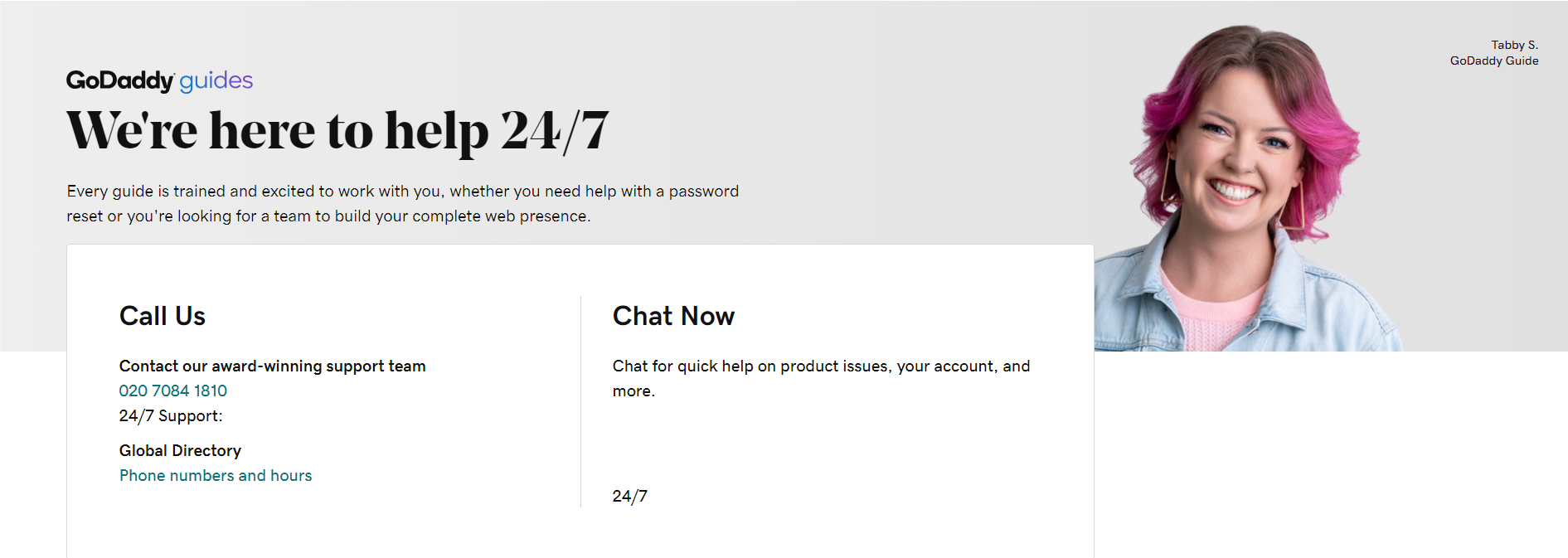Godaddy vs Web Hosting Hub: Final verdict
Looking over GoDaddy vs. WebHostingHub, it’s clear why both hosts are so popular. They have both hosted millions of
websites that run on WordPress for decades, building up a loyal customer base.
-
GoDaddy (Overall grade: 7.8)
offers a wide array of hosting types, including shared, WordPress, and VPS hosting, which makes it suitable for various users, from small business owners to high-traffic websites. Its strengths lie in the advanced security features, impressive website speed, and flexible, scalable hosting plans. However, GoDaddy falls short in customer satisfaction, with some users experiencing inconsistent service and upselling issues.
Web Hosting Hub (Overall grade: 7.5)
provides tailored solutions for WordPress and E-commerce hosting but lacks shared and VPS hosting options. It shines with exceptional uptime and accessible customer support, making it ideal for agencies and users needing unlimited websites and strong application support. Despite the lack of advanced features and scalability found in GoDaddy, it remains a solid choice for those requiring straightforward, reliable services.
 Overall grade:7.8 |
 Overall grade:7.5 |
|
|---|---|---|
| Uptime and Availability | 8.6 | 9.2 |
| Hosting Performance | 8.1 | 5.0 |
| Hosting Security | 8.6 | 8.0 |
| Price | 7.7 | 7.6 |
| Hosting Features | 7.1 | 6.9 |
| Ease Of Setup | 8.7 | 8.8 |
| User Management | 5.0 | 7.1 |
| Customer Support | 8.2 | 7.8 |
| User feedback | 3.9/5 | 4.5/5 |
Hosting types offered
Both platforms provide a variety of hosting types, each designed to meet the different needs of users.
 |
 |
|
|---|---|---|
| Shared hosting | ||
| Cloud hosting | ||
| WordPress hosting | ||
| Ecommerce hosting | ||
| VPS hosting | ||
| Dedicated hosting |
Although both offer a variety of hosting plans tailored to different needs, in
certain cases, one platform may prove to be more suitable.
Detailed comparison
Uptime and availability
Evaluates the average uptime statistics, uptime guarantee and overall availability of the hosting
provider
Score Components:
- Uptime percentage (30%): evaluates the uptime statistics in given period of time
- Uptime guarantee (20%): Assesses if the platform offers an uptime guarantee and
whether the actual uptime matches the promised guarantee. - General performance (25%): Evaluates how fast is the average response time and overall
it’s stability. - Responsiveness (10%): Adaptability to different devices and screen sizes.
- Availability (25%): Reflects the total downtime and number of outages.
 8.6
8.6
 9.2
9.2
🏆 Winner Web Hosting Hub: Exceptional speed, great uptime, and value-packed features.

Web Hosting Hub stands out with its impressive uptime and availability. The provider offers various plans featuring free SSDs, which significantly enhance performance and contribute to their notable reliability. Customers benefit from free SSL and unlimited bandwidth, ensuring continuous site accessibility. The hosting plans, especially the Nitro and Dynamo plans, offer increased performance, reinforcing their top-notch service.

GoDaddy, with its 99.98% uptime during testing, offers a reliable service but falls short with frequent short downtimes in their WordPress hosting. While the server response time is competitive, the regular drops in availability could impact some users. Their compensation for downtime is limited to a 5% credit towards additional GoDaddy services, which may not be satisfying for all clients. Overall, Web Hosting Hub’s features and performance place it ahead in this comparison.
Which one has better hosting performance?
Score Components:
- Hosting speed (30%): This includes SSD quality, Load times, PageSpeed score ranges,
additional information on website speed, built-in plugins for performance enhancement, available caching
methods, and CPU/RAM options - CDN (20%): Considers whether CDN is available or not, whether it’s free or paid, and
the quality of the CDN service - Available data centers (30%): Evaluates the number of data centers and their locations
globally. - Scalibility (20%): Looks at whether elastic scaling is available, the process required
to scale (manual upgrade vs. automatic scaling), the presence of dedicated servers, and the costs
associated with scaling.
 8.1
8.1
 5.0
5.0
🏆 Winner GoDaddy: Superior speed and reliability with enhanced data center reach.
Comparing general performance, GoDaddy offers optimized servers with up to 40% faster response times, supported by global data centers in North America, Europe, and Asia-Pacific for quicker page loads. GoDaddy’s CDN services aren’t mentioned, but their high-speed NVMe SSDs provide rapid load times, bolstered by unmetered bandwidth and advanced DDoS protection. In comparison, Web Hosting Hub’s performance varies by plan, with higher plans offering more processes and memory. Their SSDs claim a 20x speed boost, but the CDN is not mentioned. Web Hosting Hub has unlimited storage and bandwidth, but lower RAM and fewer processes in the entry-level plan.
Website Speed
GoDaddy’s combination of optimized servers, NVMe SSD storage, and global data centers ensures remarkable website speed. With features like 1-click WordPress installs and a free migration tool, they cater to users seeking swift performance. Web Hosting Hub offers free SSDs and varying performance levels depending on the plan, but their overall performance lags behind GoDaddy. While both offer free SSL certificates, GoDaddy’s daily backups and 24/7 monitoring contribute further to maintaining high website speeds.
Scalability
GoDaddy provides scalable options with its range of plans, from basic shared resources to dedicated ones in higher tiers, including Web Hosting Plus for high-traffic sites. VPS hosting is also available with adjustable RAM and CPUs. Web Hosting Hub doesn’t specify if scaling is automatic but provides higher resource limits in its advanced plans. Information regarding dedicated servers or automatic scaling on Web Hosting Hub is unavailable. GoDaddy’s diverse plans and clear scaling options make it a comprehensive choice for businesses with varying needs.
Which one has better security features?
and regulatory requirements
Score Components:
- Technical security measures (40%): This includes encryption, firewalls, DDoS
protection, secure configurations, server monitoring, access control and availability of security addons
(e.g Sitelock security). - Operational security measures (30%): Encompasses data privacy, backups and data
redundancy. - Compliance and certifications (20%): Adherence to legal and regulatory requirements
(e.g., GDPR, HIPAA) and possession of certifications (e.g., ISO 27001, SOC 2). - Business and reliability (10%): Factors in the provider’s reputation, uptime
guarantees, and customer support.
 8.6
8.6
 8.0
8.0
🏆 Winner GoDaddy: A robust hosting service with advanced security features.
Both GoDaddy and Web Hosting Hub, have notable differences in their approaches to technical and operational
security, as well as in their compliance with regulations.
Technical security measures:
GoDaddy excels with comprehensive SSL certificate support including AutoSSL, Managed SSL Service, and Self-Managed SSL options. It ensures websites have continuous encryption with auto-renewal features. It also supports the latest PHP versions, providing Zend long-term support for versions 7.4 and 8.0, which is a step ahead of Web Hosting Hub’s support limited to PHP 7. Web Hosting Hub offers security features like advanced firewall protection and suPHP encryption, but GoDaddy’s offerings are more extensive with additional features like DDoS protection, malware scanning, and a Web Application Firewall (WAF).
Operational security measures:
GoDaddy offers a wealth of operational security measures such as daily automatic backups, 24/7 DDoS protection, and global data centers for faster page loads. They also provide CloudLinux and Cage FS for balanced resource usage and virtual file system protection. Web Hosting Hub has robust operational measures like IP blocking, password-protected directories, SSH access, and custom cron jobs but lacks features like balanced CPU and RAM management and global data centers which offer enhanced performance and reliability.
Compliance and certifications:
GoDaddy clearly states its compliance with GDPR, providing users with control over their data, detailed privacy policies, and staff training on data protection. GoDaddy also supports PCI compliance through certified products designed for secure payment processing. Web Hosting Hub emphasizes data security and privacy but does not explicitly mention GDPR or PCI compliance, which can be critical for businesses requiring adherence to these regulations.
 |
 |
|
|---|---|---|
SSL certificate |
Extensive |
Yes |
Additional security features |
Comprehensive |
Advanced firewall, suPHP |
PHP versions |
Latest (7.4, 8.0) |
PHP 7 |
GDPR compliance |
Yes |
Not specified |
HIPAA compliance |
Not specified |
Not specified |
PCI compliance |
Yes |
Not specified |
Hosting features
Score Components:
- Domains (20%): Assesses the availability of a free domain, domain purchase options, and
pricing - Email (15%): Considers if the provider offers full email hosting, or is reselling
third-party service, and if the email is only transactional or not - Website builder (15%): Checks if website builder is available, and it’s user
friendliness and overall the level of customization allowed. - Staging environment (20%): Determines if a staging environment is available, allowing
for testing changes before going live. - FTP & SFTP accounts (10%): Evaluates if and how easily users can access FTP and
SFTP accounts - Git and SSH access (20%): Assess whether Git is integrated into the hosting service and
if SSH access is provided
 7.1
7.1
 6.9
6.9
🏆 Winner: GoDaddy: Offers a comprehensive range of hosting plans and services well-suited for varying needs.
GoDaddy and Web Hosting Hub both provide robust hosting solutions, but their offerings may appeal to different users based on specific needs. GoDaddy includes a free website builder and an AI creation tool, catering to users who may not have advanced technical skills but still need a seamless website-building experience. In contrast, Web Hosting Hub’s BoldGrid offers a drag-and-drop interface, enabling more complex customization. Both providers offer free domains and SSL certificates, enhancing initial cost savings. GoDaddy’s free domain, SSL, and email services extend for the first year, and the standard plans support additional features such as unlimited SSL certificates for higher-tier plans. Web Hosting Hub also provides unlimited websites, databases, and email accounts for all but the Spark Plan, offering extensive scalability without added costs.
In terms of performance and user experience, GoDaddy shines with its Managed WordPress Hosting, which includes pre-installed WordPress and one-click migration, making it ideal for users focused on WordPress sites. Additionally, GoDaddy’s automatic daily backups and unmetered bandwidth ensure robust data protection and scalability. On the other hand, Web Hosting Hub offers performance-boosted plans such as Nitro and Dynamo, which provide 2X and 4X performance enhancements. Web Hosting Hub also ensures unlimited storage and bandwidth across all plans, which might attract users seeking no limits on resource usage. The choice between GoDaddy and Web Hosting Hub largely depends on specific needs such as performance, scalability, and added features.
 |
 |
|
|---|---|---|
Free Domain |
Yes, for the first year |
Yes, for the first year |
Free SSL |
Yes, for the first year (unlimited for higher tiers) |
Yes |
Email Hosting |
Yes |
Yes |
Website Builder |
Yes (Free website builder and AI creation tool) |
Yes (BoldGrid) |
Staging Environment |
Yes (higher tiers) |
No |
FTP & SFTP accounts |
Yes |
Yes |
Git and SSH Access |
Yes (with VPS plans) |
Yes |
Free Backup |
Yes |
Optional ($1/month) |
Money Back Guarantee |
Yes (30-day) |
Yes (90-day) |
a location.
As a result in rare cases the features mentioned here can differ from the ones you see on their websites.
Both providers support a range of users from beginners to experts with user-friendly website builders and WordPress staging areas. However, in terms of developer tools, both GoDaddy and Web Hosting Hub offer robust options including SSH access, support for multiple programming languages, and Git for version control, thus appealing to developers looking for advanced capabilities.
Email services:
GoDaddy offers free email hosting for the first year with all its plans, which includes the setup of custom email addresses. There is also the option to purchase Google Workspace for advanced email management. Web Hosting Hub includes unlimited email accounts across all plans, allowing extensive use without added costs. Both providers support secure email protocols like POP3 and IMAP, ensuring compatibility with various devices and email clients.
Price
Score Components:
- Plan value (40%): What each pricing tier offers.
- Transparency and clarity (30%): Clearness of pricing structures.
- Flexibility of plans (20%): Range of options to suit different budgets.
- Hidden costs (10%): Additional expenses not included in the plan.
 7.7
7.7
 7.6
7.6
🏆 Winner GoDaddy: GoDaddy offers diverse hosting plans with comprehensive features suitable for various needs, making it a versatile choice for many users.
Evaluating the pricing of plans among various hosting providers can be complex due to their differing pricing and renewal strategies. Additionally, certain plans require annual commitments, which adds to the difficulty of making comparisons. The prices listed are based on monthly commitments; plans requiring annual commitments are indicated. Additionally, although some providers offer identical plans for WordPress and shared hosting, we have created separate tables for each to enhance clarity.
GoDaddy and Web Hosting Hub offer varied plans catering to different types of users. GoDaddy provides a range of web hosting, WordPress, VPS, and WooCommerce plans at multiple pricing levels, with features such as free domain names, SSL certificates, and email accounts. Web Hosting Hub, on the other hand, features three main plans targeting beginners to dynamic website owners, with unlimited storage and bandwidth along with additional perks like free advertising credits and website transfers. Both providers ensure round-the-clock support and offer tools for easy website migration.
 |
 |
|---|---|
|
Managed WordPress Basic $12.99
1 website, 10 GB NVMe storage, free domain & SSL, WordPress pre-installed, AI creation tool, weekly backups, WAF, automated malware scans. Value for price:8.0
|
N/A |
|
Managed WordPress Deluxe $13.99
1 website, 20 GB NVMe storage, free domain & SSL, WordPress pre-installed, AI creation tool, daily backups, WAF, automated malware scans, 2x faster with CDN, enhanced security with DDoS protection, staging site. Value for price:8.5
|
N/A |
|
Managed WordPress Ultimate $15.99
1 website, 30 GB NVMe storage, free domain & SSL, WordPress pre-installed, AI creation tool, daily + on-demand backups, WAF, automated malware scans, 2x faster with CDN, enhanced security with DDoS protection, staging site, SEO optimizer, code optimizer, smart plugin manager, WooCommerce, priority support. Value for price:9.0
|
N/A |
 |
 |
|---|---|
|
Web Hosting Economy $5.99
1 website, 25 GB NVMe storage, shared RAM and vCPU, free domain, email, SSL, 30-day money-back guarantee, WordPress migration tool, 10 databases. Value for price:7.5
|
Spark Plan $11.99
2 websites, unlimited storage & bandwidth, standard speed, free domain, SSL, SSD, advertising credits, 10 databases, email accounts, free website transfer, auto-installed WordPress & shopping cart. Value for price:7.0
|
|
Web Hosting Deluxe $7.99
10 websites, 50 GB NVMe storage, shared RAM and vCPU, free domain, email, unlimited SSL for all websites, 30-day money-back guarantee, WordPress migration tool, 25 databases. Value for price:8.0
|
Nitro Plan $15.49
Unlimited websites, unlimited storage & bandwidth, 2x speed, free domain, SSL, SSD, advertising credits, unlimited databases, email accounts, free website transfer, auto-installed WordPress & shopping cart. Value for price:8.0
|
|
Web Hosting Ultimate $12.99
25 websites, 75 GB NVMe storage, shared RAM and vCPU, free domain, email, unlimited SSL for all websites, 30-day money-back guarantee, WordPress migration tool, 50 databases. Value for price:8.5
|
Dynamo Plan $20.49
Unlimited websites, unlimited storage & bandwidth, 4x speed, free domain, SSL, SSD, advertising credits, unlimited databases, email accounts, free website transfer, auto-installed WordPress & shopping cart. Value for price:8.5
|
|
Web Hosting Maximum $17.99
50 websites, 100 GB NVMe storage, shared RAM and vCPU, free domain, email, unlimited SSL for all websites, 30-day money-back guarantee, WordPress migration tool, 100 databases. Value for price:8.8
|
N/A |
 |
 |
|---|---|
|
1 vCPU / 2GB RAM $8.99
1 vCPU core, 2 GB RAM, 40 GB NVMe SSD storage, snapshot backups, Linux only, cPanel or Plesk, 1 additional IP, global data centers. Value for price:7.7
|
N/A |
|
2 vCPU / 4GB RAM $17.99
2 vCPU cores, 4 GB RAM, 100 GB NVMe SSD storage, snapshot backups, Linux or Windows, cPanel or Plesk, 2 additional IPs, global data centers. Value for price:8.0
|
N/A |
|
4 vCPU / 8GB RAM $34.99
4 vCPU cores, 8 GB RAM, 200 GB NVMe SSD storage, snapshot backups, Linux or Windows, cPanel or Plesk, 3 additional IPs, global data centers. Value for price:8.3
|
N/A |
|
4 vCPU / 16GB RAM $44.99
4 vCPU cores, 16 GB RAM, 200 GB NVMe SSD storage, snapshot backups, Linux or Windows, cPanel or Plesk, 3 additional IPs, global data centers. Value for price:8.5
|
N/A |
As a result in rare cases the prices displayed here can differ from the ones you see on their websites.
Enterprise plans
Enterprise users can find substantial offerings in both hosting providers. GoDaddy’s “Managed WooCommerce Expand” plan, priced at $129.99/month, includes AWS hosting, support for existing WordPress site migration, and the capability to handle up to 5,000 orders/month. Conversely, Web Hosting Hub’s “Dynamo Plan” offers unlimited websites, storage, and bandwidth at a competitive price of $20.49/month. Both plans offer extensive support, ensuring a scalable solution for enterprise needs.
Godaddy vs Web Hosting Hub: Ease of setup
platform.
Score Components:
- Site migration (25%): Assesses whether the provider offers tools for site migration,
either automated or manual, and whether these services are free or require a fee. - Admin panel usability (35%): Evaluates the type of admin panel provided, such as the
standard cPanel or a custom solution, focusing on its accessibility and user-friendliness for both
technical and non-technical users. - Setup features (20%): Examines the availability and ease of use of various setup
features, including FTP accounts, file managers, email account setup, PHPMyAdmin, and easy CDN
configuration. - Help center quality (20%): Measures the quality and accessibility of the provider’s
help center resources, including articles and tutorials.
 8.7
8.7
 8.8
8.8
🏆 Winner
Web Hosting Hub: Offers an intuitive setup process and a generous feature set suitable for various levels of expertise.
Web Hosting Hub provides access to Softaculous for easy one-click installations of over 400 applications, including WordPress, Joomla!, and Drupal. They also feature a drag-and-drop website builder, BoldGrid, which simplifies the creation of websites without needing extensive technical know-how. Both hosting providers offer user-friendly interfaces, but Web Hosting Hub’s additional tools like BoldGrid make it an appealing choice for users who prefer a more hands-on approach without needing to delve deeply into technical details.

GoDaddy utilizes the industry-standard cPanel, making it accessible for both technical and non-technical users to install apps, manage backups, and enhance security. The control panel’s interface is straightforward, which reduces the learning curve, especially for those new to web hosting.

Regarding automated tools for website migration, GoDaddy offers a free WordPress migration tool, which makes moving WordPress-based sites to their servers relatively hassle-free. This tool helps users minimize the technical challenges typically associated with migrating a website. Web Hosting Hub also facilitates the migration process by providing free domain transfers and auto-install options for WordPress and PrestaShop during checkout. Both hosting providers prioritize ease of migration, but GoDaddy’s specialized WordPress migration tool offers a slight advantage for users specifically looking to migrate WordPress sites.
The platforms provide extensive knowledge bases filled with guides, how-to articles, and instructional content. GoDaddy offers extensive support including a 24/7 customer service team accessible via phone, chat, and even SMS. Web Hosting Hub also provides round-the-clock support via live chat and phone, supplemented by an elaborate Help Center with tutorials, a Learning Corner, community Q&A, and various tools and resources. Both providers offer valuable support options, but Web Hosting Hub’s community engagement and variety of resources give it a slight edge in accessibility and user assistance.
User management
accessibility.
Score Components:
- Role customization (40%): Flexibility in creating and defining user roles and
permissions. - Ease of management (30%): User interface and tools for managing users.
- Access control (20%): Effectiveness of access control measures for different user
levels. - Scalability (10%): Ability to manage a growing number of users efficiently.
 5.0
5.0
 7.1
7.1
🏆 Winner
Web Hosting Hub: Streamlined user management with extensive permissions and accessibility options.
Both GoDaddy and Web Hosting Hub offer functionalities for managing user roles, permissions, and accessibility, but Web Hosting Hub clearly provides a broader and more detailed set of features. GoDaddy’s user management capabilities are undisclosed in the context provided, suggesting that users might need to rely on external documentation to fully understand its user management functionalities. In contrast, Web Hosting Hub allows for comprehensive management of email accounts, FTP accounts, databases, security measures, and SSH access. This extensive detail in user permissions and roles gives Web Hosting Hub the upper hand in terms of clarity and control.
In terms of user interfaces and tools, without specific information about GoDaddy’s offerings, it’s difficult to make a direct comparison. Web Hosting Hub, however, utilizes cPanel for its user management tasks, which is renowned for its intuitive and user-friendly interface. Through cPanel, users can effortlessly navigate and manage their email accounts, FTP settings, database configurations, and security parameters. The familiarity and ease of use of cPanel make managing users straightforward and efficient.
Assessing the effectiveness of access control measures, Web Hosting Hub demonstrates detailed options for creating password-protected directories and blocking visitors by IP, which enhances security. The ability to set specific access levels for FTP accounts increases flexibility and control. With GoDaddy’s user management practices not disclosed, Web Hosting Hub’s explicit functionalities around access control and user scalability provide confidence in handling a growing number of users and maintaining robust security procedures.
Web Hosting Hub user roles table:
| Role | Description | Access highlights |
|---|---|---|
| Email Admin | Manages email addresses and settings. | Create addresses, customize SPAM filtering, set up forwarding. |
| Security Admin | Handles security settings and permissions. | Create password-protected directories, block IPs. |
| FTP Manager | Manages FTP accounts and file access levels. | Create and assign access levels to FTP accounts. |
| Database Admin | Manages database settings and user privileges. | Create/manage database users, access phpMyAdmin. |
| Domain Manager | Oversees domain and sub-domain management. | Manage multiple domains, create subdomains and redirects. |
Customer support
hosting provider.
Score Components:
- Support communication channels (30%): Measures the variety of customer support types
provided (live chat, chatbot, email, phone, etc.) - Availability (20%): Assesses the availability hours for each channel, including 24/7
support options. - Technical support quality (30%): Assesses whether the provider offers comprehensive
technical support, including hardware upgrades (e.g., HDD to SSD), software installations, and web
server configuration changes. - Enterprise support (20%): Checks if there are dedicated or priority support services
for enterprise-level customers.
 8.2
8.2
 7.8
7.8
🏆 Winner GoDaddy: GoDaddy excels with an extensive array of customer support options and additional security features.
 |
 |
|
|---|---|---|
Phone support |
||
Live chat support |
||
Chatbot |
||
Email/ticket support |
||
Enterprise support (dedicated agent, priority support) |

GoDaddy offers around-the-clock support via phone, email, and a large knowledge base, making it easy for users to find help when needed. With additional features such as free 24×7 support, automatic daily backups, and global data centers, GoDaddy provides a comprehensive support experience. Their availability of SMS support and a 30-day money-back guarantee further enhance their appeal.

Web Hosting Hub also offers 24/7 support, primarily U.S.-based, with a variety of contact methods including phone, email, and live chat. Notably, they offer a 90-day full money-back guarantee and have a designated sales and billing department with specific accessible hours. Their support structure is enhanced by options such as Skype calls, which can be convenient for users seeking different communication channels.
Godaddy vs Web Hosting Hub: User feedback
GoDaddy generally receives praise for its ease of use, affordability, comprehensive service offerings, and user-friendly interface, making it a popular choice for domain registration and basic web hosting. Many users appreciate the ability to purchase domains, web hosting, email services, and other digital products all in one place, along with frequent discounts for new customers. However, customer service experiences are inconsistent; while some users find it helpful and responsive, others report long wait times and unknowledgeable support staff. Additionally, recurring issues include high renewal costs, persistent upselling, and occasional technical difficulties.
Users consistently praise the hosting provider for its easy-to-use interface, robust hosting tools, and extensive features, making it particularly suitable for WordPress implementation. Customer support is often highlighted as responsive and helpful, contributing to an overall positive experience. However, some criticisms include occasional connectivity issues, a somewhat technical and overwhelming interface, and slightly higher costs for certain services like SSL for shared hosting. Despite these minor drawbacks, many users find the service affordable and reliable, offering good value for their needs.
Godaddy vs Web Hosting Hub: FAQ
Which platform is better suited for hosting WordPress websites?
Both GoDaddy and Web Hosting Hub are equally suitable for hosting WordPress websites, offering auto-installed WordPress, free SSL, and daily backups. The choice between them would depend on other specific needs such as performance and customer support. Both platforms effectively tie in this category, making either a viable option for WordPress hosting.
Which hosting service offers better security features?
GoDaddy offers more comprehensive security features, including AutoSSL, Managed SSL Service, DDoS protection, malware scanning, and a Web Application Firewall (WAF). Web Hosting Hub provides advanced firewall protection and suPHP encryption but lacks some of GoDaddy’s extensive security measures. Therefore, GoDaddy edges out Web Hosting Hub in terms of overall security offerings.
Which platform offers better customer support?
Web Hosting Hub offers robust customer support, including U.S.-based 24/7 support via phone, live chat, and email, along with a 90-day money-back guarantee and options for Skype calls. GoDaddy also provides 24/7 support via phone, email, and an extensive knowledge base but has mixed reviews regarding support responsiveness and expertise. Overall, Web Hosting Hub has a slight edge due to its more consistent customer support experience.
Which hosting service offers more scalability options for growing websites?
GoDaddy provides a wide range of scalable hosting solutions, including shared plans, VPS, and options for dedicated servers. Users can seamlessly transition between plans to accommodate growing traffic and resource needs. Web Hosting Hub offers three tiered plans but lacks automatic scalability and dedicated server options, making GoDaddy the more adaptable option for growing websites.
How do the providers handle email hosting and what features are included?
GoDaddy offers free email hosting for the first year with all its plans, along with the option to purchase Google Workspace for advanced email management. Web Hosting Hub includes unlimited email accounts across all plans, ensuring extensive use without added costs. Both providers support secure email protocols like POP3 and IMAP, making them compatible with various devices and email clients.
The making of this blog
We followed a clear, step-by-step process to write and research this article.








